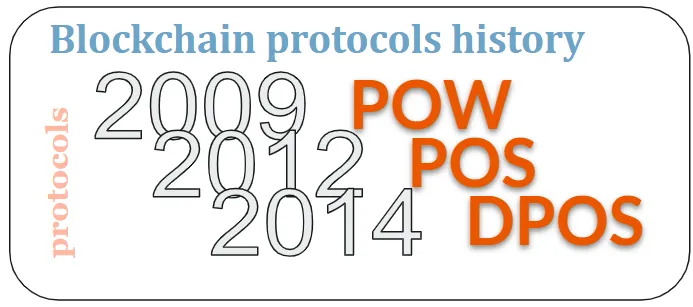
English
[EN] - Blockchain protocols: POW, POS and DPOS
In DLT (Distributed Ledger Technology, distributed ledger systems), the authenticity of transactions and information is certified by the blockchain participants with the highest computational throughput (also called "miners"). Authenticity is recorded through the consensus protocol.
The most popular consensus protocols are: proof of work, proof of stake and Delegated Proof of Stake.
POW: Proof of Work, or PoW, is an algorithm that is used by several cryptocurrencies such as Bitcoin, Ethereum, Litecoin. In this consensus protocol, transactions are verified through mining activity and the algorithm is used to confirm transactions and produce new blocks.
POS:Proof of Stake constitutes an alternative method to Proof of Work. It was first proposed by a Bitcointalk forum user in 2012 because PoW is wasteful in terms of electricity and energy. In POS blockchains, the user puts their coins into "staking", this locks them within a wallet to feed the blockchain itself. So a POS blockchain rewards those who have frozen their investment by contributing to the network.
DPOS:The Delegated Proof of Stake is an evolution of the proof of stake protocol. It was first used on the Bitshares blockchain and was conceived by developer Daniel Larimer. In PoS to validate a transaction you have to involve the entire network, while in DPOS this activity is performed by a limited number of delegates.
Italian
[IT] - I protocolli blockchain: POW, POS e DPOS
Nel sistema DLT (Distributed Ledger Technology, sistemi a registri distribuiti), l'autenticità delle transazioni e delle informazioni è certificata dai partecipanti alla blockchain con il più alto rendimento computazionale (detti anche “miners”). L'autenticità viene registrata tramite il protocollo di consenso.
I protocolli di consenso più conosciuti sono: il proof of work, proof of stake ed il Delegated Proof of Stake.
POW: La Proof of Work, o PoW, è un algoritmo che viene utilizzato da diverse criptovalute come Bitcoin, Ethereum, Litecoin. In questo protocollo di consenso le transazioni vengono verificate attraverso l'attività di mining e l'algoritmo viene utilizzato per confermare le transazioni e produrre nuovi blocchi.
POS:La Proof of Stake costituisce un metodo alternativo alla Proof of Work. E’ stato proposto per la prima volta da un utente del forum Bitcointalk nel 2012 perché il PoW è dispendioso in termini di elettricità ed energia. Nelle blockchain POS l'utente mette le proprie monete in "staking", ciò le blocca all'intero di un portafoglio per alimentare la blockchain stessa. Quindi una blockchain POS premia chi ha congelato il proprio investimento contribuendo alla rete.
DPOS:La Delegated Proof of Stake è un’evoluzione del protocollo proof of stake. E’ stato utilizzato per la prima volta sulla blockchain Bitshares ed è stato ideato dallo sviluppatore Daniel Larimer. Nella PoS per convalidare una transazione bisogna coinvolgere l’intero network, mentre nella DPOS questa attività è svolta da un limitato numero di delegati.
